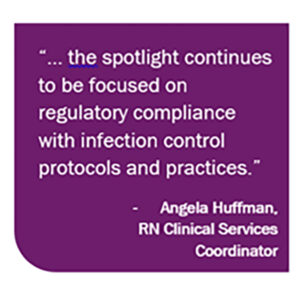By Angela Huffman, RN Clinical Services Coordinator
Because of COVID-19, our residents, staff, physicians, families, visitors and regulators have been challenged and impacted in a variety of ways. In light of the infectious nature of this virus, the spotlight continues to be focused on regulatory compliance with infection control protocols and practices.
 Infection control practices have been reinforced through training and ongoing monitoring in hand hygiene, proper use, application and removal of personal protective equipment (PPE), cleaning and disinfection practices, cohort strategies, proper linen handling and testing.
Infection control practices have been reinforced through training and ongoing monitoring in hand hygiene, proper use, application and removal of personal protective equipment (PPE), cleaning and disinfection practices, cohort strategies, proper linen handling and testing.
Our regulatory bodies have increased monitoring of our compliance through on-site inspections and observations, review of infection-control policies and procedures, and offsite review of mandatory reporting requirements and data review.
F880 Infection Prevention & Control is a longstanding federal nursing home requirement for infection prevention and control in accordance with Centers for Medicare & Medicaid Services (CMS). For a number of years, F880 has been in the “Top 5” of regulations most frequently cited in skilled nursing facilities. This regulation requires that facilities:
- Develop and implement an ongoing infection prevention and control program to prevent, recognize, and control the onset and spread of infection to the extent possible
- Establish facility-wide systems for the prevention, identification, investigation and control of infections of residents, staff, and visitors. It must include an ongoing system of surveillance designed to identify possible communicable diseases or infections before they can spread to other persons in the facility and procedures for reporting possible incidents of communicable disease or infections;
- Establish an Infection Prevention & Control Program (IPCP) that:
- Establishes a system for preventing, identifying, reporting, investigating, and controlling infections and communicable diseases for all residents, staff, volunteers, visitors, and other individuals providing services under a contractual arrangement;
- Follows accepted national standards;
- Has written standards, policies, and procedures for the program that include: surveillance and isolation procedures, reporting communicable diseases, hand hygiene, employee health and work restrictions, linen handling.
In direct response to the national impact that COVID-19 has had on skilled nursing facilities, the federal government has enacted three new regulations with which we must maintain compliance. CMS has put two new sets of reporting requirements into effect. The first requires nursing homes to report confirmed or suspected cases of COVID-19 to the Centers for Disease Control (CDC) to assist with infection surveillance.
The second type of reporting relates to communication with residents, their representatives and family members of actual or suspected cases of COVID-19 in nursing homes when an outbreak occurs and at least weekly. The communication to residents, staff and families can take on many forms that can include: phone calls, letters, Facebook updates, email updates, pre-recorded messages and text messaging.
The third update is regulation F866 that enhances efforts to keep COVID-19 from entering and spreading through nursing homes, requiring facilities to test residents and staff based on state and federal government parameters.
Although personal care homes are not regulated by the federal government, our licensed facilities follow specific state licensing requirements. Just as our skilled communities, personal care homes also have regulations for infection control and sanitation standards. During an inspection, regulators will examine all areas of the home to determine if unsanitary conditions exist. Inspectors will interview the administrator and staff regarding universal precaution and observe staff for the implementation of universal precautions. Universal precautions include the areas of hand hygiene, glove use, linen handling, safe sharps, cleaning and disinfection.
The Department of Health and Human Services (DHS) that oversees regulatory compliance for personal care homes has not enacted any new specific regulatory requirements in response to the COVID-19 pandemic, but has offered additional guidance, similar to the enhanced guidelines offered to skilled nursing facilities. That guidance has been implemented for completion of baseline testing, screening for residents, staff and family members for signs and symptoms of COVID-19, visitation restriction and reopening guidance.
DHS has most recently enacted guidance for ongoing testing for staff, based upon the positivity rate of the county where the community is located. The guidance includes testing of residents who leave the facility routinely for outpatient health care visits including dialysis treatment, social visits in the community, day programs, employment, and upon return after admission to another health care facility.
Prior to COVID -19, achieving and maintaining compliance with infection prevention and control standards was a focus for both our skilled and personal care communities. All of the communities complete annual and as-needed infection control education and monitor practices on a daily basis to ensure that we are providing a safe, clean and sanitary environment for residents, staff, families and visitors.

